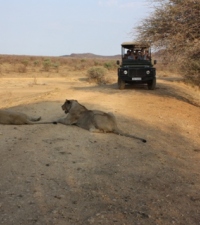Transport, Traffic, and Rules of the Road

Roads & Driving
South Africa is a vast country that is nevertheless equipped with an excellent network of roads, particularly compared to the rest of Africa. You can get almost anywhere in South Africa by car, though some more remote locations and game reserves are only accessible via gravel road. A 4x4 vehicle is a very good investment for expats who want to explore the country.
As a result, however, rush-our traffic is very heavy, and most expats learn to rise early to be able to leave for work before 6:00 am, not to return until after 6:00 pm. Google Maps has recently been made available for the major South African cities so that checking possible commutes online is an excellent tool for future expats. Other than the clogged roads, traffic is not chaotic and all rules are more or less observed. Traffic lights are called robots and tend to malfunction frequently, in which case the affected intersection reverts to a four-way stop.
Driving on the left side of the road might be a novelty to expats from the U.S. or most of Western Europe, especially if you are planning to have a manual transmission car.
If you are on a regular work visa and not a permanent resident, you will not have to (in fact, cannot) get a South African drivers license. Foreign licenses issued in English (or, to be precise, any one of South Africa’s eleven official languages) and with a photograph are valid as long as they are valid in the country of issue. Traffic police are known to dispute this fact or to ask for myriads of additional information, mostly as a veiled demand for a bribe, so it is best to be prepared on this point and remain firm.
Rental cars are not expensive and easy to obtain throughout South African cities and airports. Most international rental companies are represented, as well as a few local and long-term outfits, such as Tempest Car Hire or Drive Africa (options well suited for the newly-arrived expat who might still have to wait for the proper visa before being able to buy a car).
Taxis
Taxis are not as readily available as in other major world cities. Other than at the major airports, all taxis, such as Delta Cab or Cabs for Women, have to be phoned ahead of time. The cost for a typical taxi ride ranges from ZAR50 to ZAR100.
Travel by minibus taxi, while the main form of transport for a large part of the local population, is not recommended for expats. They operate on an informal network, are often overcrowded, and the vehicles’ roadworthiness is not always guaranteed.
Plane
Air travel is fairly inexpensive throughout Southern Africa and is often the best way to bridge longer distances. South Africa’s three major airports are Johannesburg’s O.R. Tambo International Airport, Cape Town International Airport, and King Shaka Airport in Durban. In addition to South African Airways, which has the most extensive route map, there are several low-cost alternatives, such as Kulula, Mango, and 1Time.
Airport Transfers, such as EZ Shuttle, can cost ZAR200 and up but typically provide more room for your luggage than regular taxis and have to be booked ahead of time. MyCiTi in Cape Town is a fairly new bus service that offers a convenient airport link for R50 one way.
Public Transport
Public transport is very limited, particularly in and around Johannesburg, so having a car to get you to and from work and your children to school is more or less essential.
Bus
Bus service is very limited in South Africa. There are some long distance bus service providers such as Greyhound and SA Roadlink as well as various sightseeing companies offering city tours, but chances are you will not be able to make your daily commute by bus. Metrobus in the Johannesburg area only offers a very limited route network.
Train
Commuter train travel, on the other hand, has become more attractive in South Africa over the last few years, aided by the 2010 World Cup and a huge investment in new routes. Gauteng has the Gautrain connecting Johannesburg, Pretoria, and the airport via high-speed rail and it has proven to be a safe and convenient way to commute, as long as you live or work near one of the stations. Cape Town’s Integrated Rapid Transit has a more extensive network taking travelers inexpensively along the most beautiful scenery of the Cape, but IRT trains are not necessarily known for their punctuality.
Last, but not least, luxury trains such as Premier Classe or the Blue Train represent one of the most pleasant ways to discover the beauty of South Africa in a leisurely manner. As the name suggests, this is not the cheapest form of transport but will undoubtedly leave you with lasting memories of your time in South Africa.
By Sine Thieme, an American repat just returned from a three-year assignment in Johannesburg with her husband an four children, where she loved the weather, the people, going on safari, and the fact that you never quite knew when exactly 'just now' would be.
- South Africa: Expat in JHB looking for other SA expats for PhD
- South Africa: EasyExpat.com is looking for networkers/helpers for...
- South Africa: EasyExpat.com recherche des animateurs pour notre...
- South Africa: Les nouveaux expats en Afrique du Sud se présentent
- South Africa: New Members in South Africa: Welcome!
- My Life Abroad -
A selection of expat stories

"A fun compulsive read!"
J. Matcham, Amazon
"I strongly advise people ready to live abroad to read this book!"
Patrice, Amazon

 How to Pick a Safari Destination in South Africa
How to Pick a Safari Destination in South Africa Driving: Life in the fast lane
Driving: Life in the fast lane